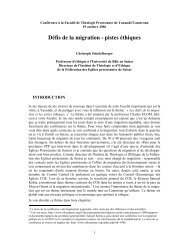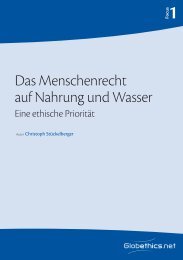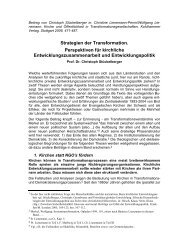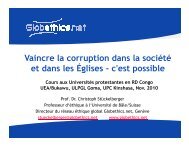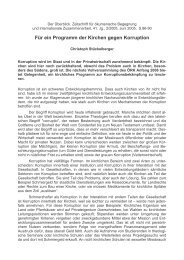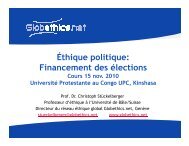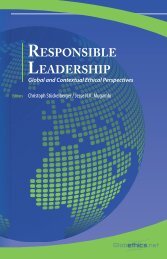BREAK THE CHAINS OF OPPRESION AND THE YOKE OF ...
BREAK THE CHAINS OF OPPRESION AND THE YOKE OF ...
BREAK THE CHAINS OF OPPRESION AND THE YOKE OF ...
You also want an ePaper? Increase the reach of your titles
YUMPU automatically turns print PDFs into web optimized ePapers that Google loves.
Ethics to others what we ourselves expect from them. This applies to individuals as well<br />
as to states and inter-state relations or to companies.<br />
This principle of tax justice applies not only with respect to countries such as the<br />
USA or Germany that can exert pressure on Switzerland, but globally, including<br />
also developing, transition and emerging countries. In its favour are not only<br />
ethical considerations but also political and economic benefits for countries like<br />
Switzerland which rather fear economic losses with a white money strategy.<br />
Ethical necessity: poverty reduction. Economically weak states rely on tax revenues<br />
even more than economically powerful countries. International efforts to find<br />
new ways to finance development have stressed this repeatedly. In addition to increased<br />
trade and aid, developing countries need just and fair taxation if they are<br />
to reduce poverty and reach the Millennium Development Goals. The annual<br />
revenue loss to developing countries because of tax flight and tax evasion is estimated<br />
to amount to 150-250 billion Swiss francs a year, which significantly exceeds<br />
the total official development assistance ODA of all the industrialized<br />
countries (100 billion per year)! Special cases such as dictatorships aside, we may<br />
recognize many developing countries governed by the rule of law where the principle<br />
of tax justice is applicable. These also need their tax systems strengthened.<br />
Switzerland should conclude more double-taxation agreements with developing<br />
countries.<br />
Political advantage: Cooperation with the EU. In the actual situation, Switzerland<br />
in Europe seems to have its back to the wall. But precisely a pro-active initiative<br />
directed beyond Europe could offer Switzerland the possibility of new coalitions.<br />
The European Commission intends to start a dialogue with developing countries<br />
to strengthen their tax systems and combat tax evasion. The “International<br />
Tax Compact” (ITC) � – �a new initiative � of the German � �Federal<br />
Ministry for Economic<br />
Cooperation and Development (BMZ) – is beginning to coordinate partners<br />
in development from industrialized and developing countries. They also<br />
take up the concerns of the International “Tax Justice Network” (TJN) of the<br />
private development agencies. The Swiss Foreign Ministry, through the Swiss<br />
Agency for Development and Cooperation (DEZA), should play a part in such<br />
initiatives. In this way, Switzerland will be not an opponent but a team player<br />
with the EU!<br />
Economic advantage: Any shortfall in Switzerland caused by less untaxed wealth<br />
from developing countries would be offset in the medium term by credible and<br />
sustainable trade relations with important Asian countries, for example, and by<br />
removing the threat to the reputation of Swiss companies and corporations. The<br />
firm position of Switzerland in the fight against money-laundering has earned<br />
her respect and economic benefits. The same can happen with a new white money<br />
strategy in the relationship with all countries.<br />
Global white money strategy: This will still allow for tax competition based on locational<br />
advantages between and within states, while at the same time respecting<br />
������������������������������������������������<br />
� � � � ����������������������� �<br />
94<br />
– CLIMATE JUSTICE <strong>AND</strong> TAX JUSTICE –



